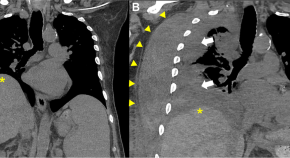Catheter-related thrombosis (CRT) in patients with solid tumors: a narrative review and clinical guidance for daily care
Authors (first, second and last of 10)

Collection
Cancer patients have a significant risk of developing venous thromboembolism (VTE); it attributes as the second leading cause of death in this population. (1,2) In addition, it negatively impacts cancer patients’ quality of life. The key to treatment of VTE is anticoagulation, however; cancer patients also have an increased risk of bleeding when anticoagulated compared to those patients without cancer. In recent years, our armamentarium for treatment of VTE has increased with the introduction of first low molecular weight heparins (LMWH) and in the past several years, the direct oral anticoagulants (DOACS). This has allowed more treatment choices for anticoagulation, but especially in the cancer population has prompted questions regarding bleeding, thrombosis recurrence, potential drug-drug interactions and barriers and equity for access. Several clinical studies spanning the different DOACS in the cancer population for VTE treatment have been published and now are being used in clinical practice in this population. (3-5) Subpopulation nuances are important to acknowledge when selecting an appropriate anticoagulant for cancer patients. In addition, the introduction of the coronavirus disease 2019 (COVID-19) pandemic has presented quandaries as we care for cancer patients. Relevant issues regarding VTE and COVID-19 as well as up to date guidelines regarding current vaccination protocols for cancer patients have been developed and have changed since vaccines were initiated. An approach to the challenges of this pandemic especially in patients with cancer is discussed. We include narrative reviews of related and relevant topics for the practicing clinicians caring for cancer patients with an objective of informing and expanding knowledge in these areas.
1. Khorana AA, Francis CW, Culakova E et al (2007) Thromboembolism is a leading cause of death in cancer patients receiving outpatient chemotherapy. J Thromb Haemost 5(3):632–634. https://doi.org/10.1111/j.1538-7836.2007.02374.x
2. Sorensen HT, Mellemkjaer L, Olsen JH et al (2000) Prognosis of cancers associated with venous thromboembolism. N Engl J Med 343(25):1846–1850. https://doi.org/10.1056/NEJM200012213432504
3. Raskob GE, van Es N, Verhamme P et al (2018) Edoxaban for the treatment of cancer-associated venous thromboembolism. N Engl J Med 378(7):615–624
4. Young AM, Marshall A, Thirlwall J et al (2018) Comparison of an oral factor Xa inhibitor with low molecular weight heparin in patients with cancer with venous thromboembolism: results of a randomized trial (SELECT-D). J Clin Oncol 36(20):2017–2023. https://doi.org/10.1200/jco.2018.78.8034
5. Agnelli G, Becattini C, Meyer G et al (2020) Apixaban for the treatment of venous thromboembolism associated with cancer. N Engl J Med 382(17):1599–1607
Department of General Internal Medicine, University of Texas M. D. Anderson Cancer Center, Houston, TX, USA




